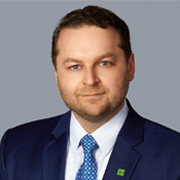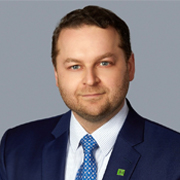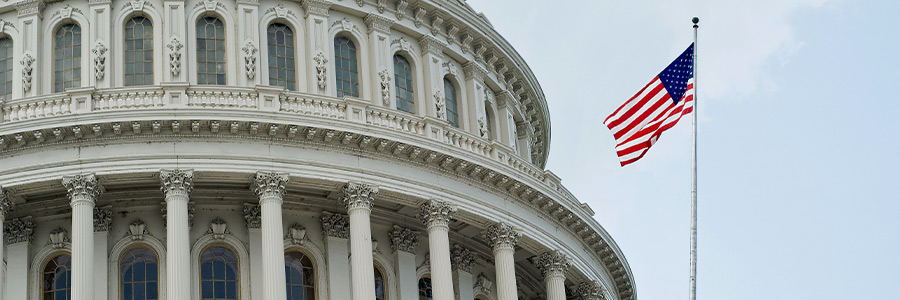January 2024 FOMC Review - It's Gonna Be May
By: Oscar Muñoz, Gennadiy Goldberg, Molly McGown, Jayati Bharadwaj
Feb. 07, 2024 - 4 minutes 30 seconds
The FOMC kept rates on hold at 5.25%-5.50% for a fourth consecutive meeting in January, as was widely expected by market participants. As we anticipated, the Committee opted for patience as it seeks to ascertain that the move lower in inflation stays sustainably at the 2% objective. Powell hinted that the Fed had some discussions about the balance sheet but are "planning to begin in-depth discussions of balance sheet issues at our next meeting in March."
While the March meeting is not completely discarded as a platform for the Fed's first rate cut, Chair Powell all but closed the door to that possibility. We continue to judge the May FOMC meeting as the most likely time for the Fed to start easing policy.
Rates: Rates bull steepened sharply even as Powell suggested that a cut is unlikely, possibly amid expectations that the first cut is a function of "when, not if". Markets may be more attentive to inflation than growth surprises in the near-term.
FX: The Fed has seemingly priced out March as the start of the cutting cycle. Near term, that could provide some support to the USD, although the Fed’s next move is likely to be a cut. USD rallies could be quickly faded, especially if the data validates the disinflation narrative ahead of the next meeting. Good growth plus disinflation remains bearish for the USD.
The first clue about the Fed's inclination to remain patient amid improving inflation was found in the post-meeting statement where the FOMC added that "[t]he Committee does not expect it will be appropriate to reduce the target range until it has gained greater confidence that inflation is moving sustainably toward 2 percent." Powell further elaborated on this idea in the post-meeting presser by flagging that the Fed is "...looking for continuing evidence to have confidence that inflation is moving sustainably at 2%...We want to see more good data. It is not that we are looking for better data but continuation of the better data."
Indeed, while the Fed clearly welcomes the deceleration in inflation, they want to make sure it is not only driven by goods deflation that could prove temporary. Solid economic growth and a still-tight labor market are allowing the Fed to avoid rushing into a decision that it may regret down the road. In our view, the Committee would like to see two things happen before they feel comfortable with easing policy:
- Confirmation that the move lower in core PCE inflation is not a mirage. Such was the case last year after CPI data was revised notably higher in January 2023. That means the CPI revisions for 2023 released on Feb 9 will be key. Furthermore, Fed officials will also like to see additional evidence that core inflation has maintained its downward trajectory at the start of the year. By the March FOMC meeting, the Committee will have in hand the CPI reports for January and February, and the PCE report for January (along with a fairly good idea regarding the February report). We think that those would constitute good-enough evidence for the Fed to ease rates in May.
- The Fed would like to see the services component of the PCE basket support the move lower in underlying inflation. While services inflation has clearly decelerated from its early 2023 peak, policymakers appear to be aiming for evidence of further progress in that segment of the basket, particularly amid a profile of strong economic activity and a still tight labor market.
Above-trend economic growth? No problem!
Interestingly, Chair Powell noted that strong economic activity is no longer seen as an obstacle for Fed easing. The Fed appears to be comfortable with above-trend growth as long as inflation remains consistent with the 2% objective. Indeed, Powell emphasized that "at this point we want to see strong growth and a strong labor market. We are not looking for a weaker labor market but for inflation to continue to come down as it has been the last six months."
With that said, the Fed also appears to be wary about overdoing the duration of policy tightening. Powell continued to acknowledge that policy remains well into restrictive territory and that, while output remains solid now, it is likely the reflection of the healing of the economy post-pandemic. As Powell flagged, "...when that peters out, I think the [monetary policy] restriction will show up more sharply."
This remains a key factor behind our expectation for recession by Q2 2023. The longer the Fed keeps tight policy in place, the more it risks the economy stumbling into recession. Admittedly, the strong showing by the consumer in 23Q4 and the firm carry-over into 24Q1 means that the odds of recession have receded — something the Fed appears to be banking on. All told, we continue to pencil in 250bp of cumulative rate cuts (200bp of those this year) as we remain of the view that growth concerns, on top of inflation normalization, will likely lead the Fed to front-load policy accommodation in 2024.
We continue to judge the May FOMC meeting as the most likely for the Fed to start easing policy. Subscribing clients can read the full article on the TD One Portal












